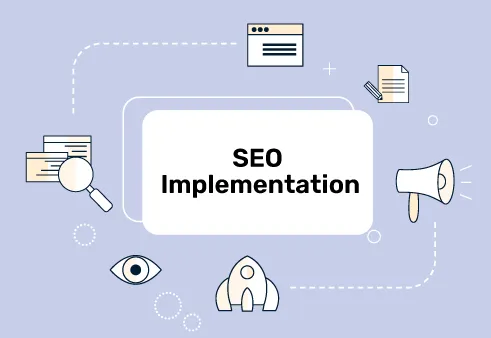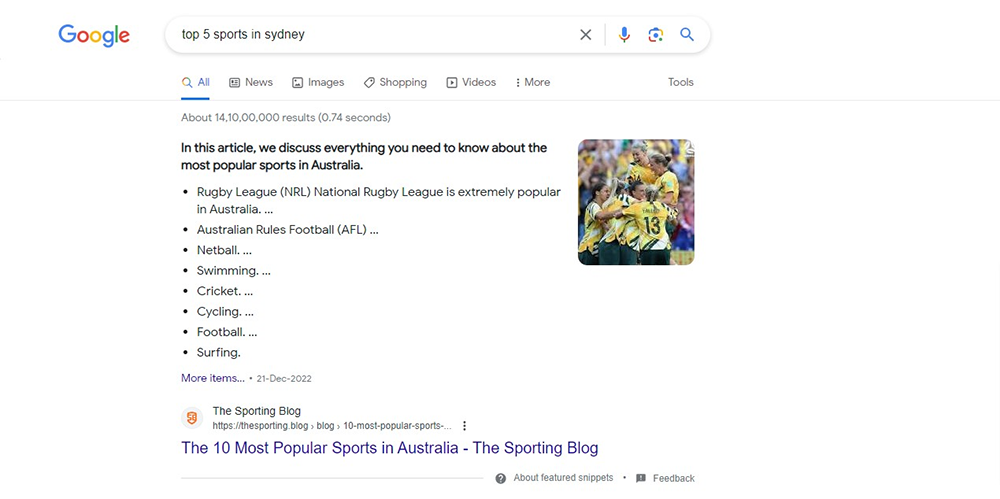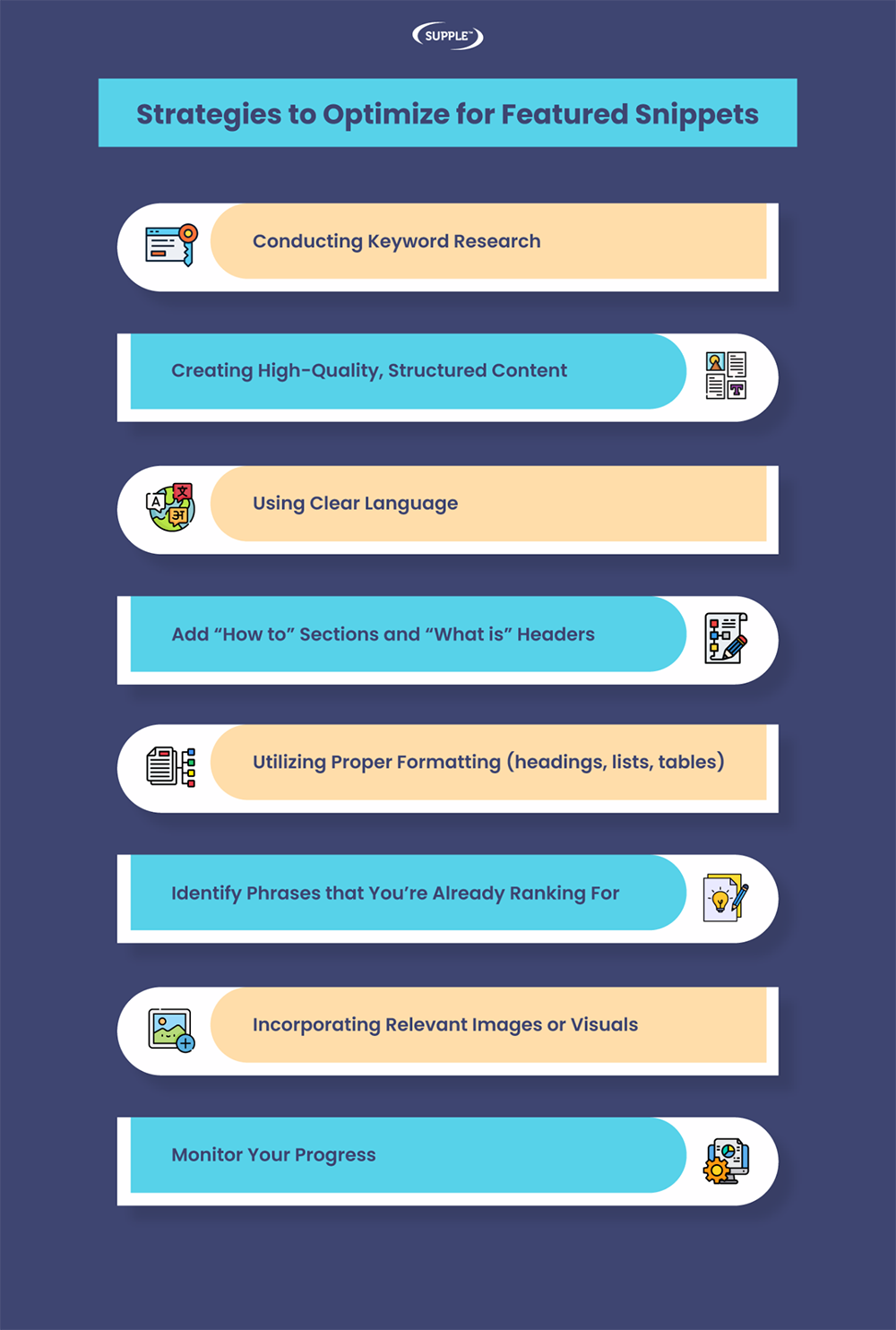
Featured snippets appear right at the top of search engine results pages (SERPs), and they are sometimes referred to as “position zero” because they appear above what would otherwise be the top-ranked listing. By optimising your website for featured snippets, you can attract more traffic and skyrocket your listing to the top of search results. The Supple team specialises in featured snippet optimisation as part of your wider SEO strategy.
Find Out What’s Holding Your Website Back – Get Your Free SEO Audit Now!
How to Optimise for Featured Snippets
There are search results and then there are special types of search results.
Featured snippets are included in the latter.
Being at the top of organic search results is the goal for many brands. And with featured snippets, they get to achieve that even if they don’t produce more content and do not have that strong of a backlinking strategy.
It allows your website to quickly jump to ‘position 0’ even if traditional ranking factors place you at the bottom of the page.
Google’s ‘Featured Snippets’ section is an integral part of its Search Engine Result Pages. What are featured snippets on Google and how can you strategise your content for the same?
You’re about to find out.

OUR SEO PROCESS
The First Page of Google!
Research
In this phase, our SEO consultants will work with you to understand your business and define the goals of our SEO campaign. We will perform competitor research and search intent analysis before identifying the keywords that we think you should target.

Audit
Our comprehensive SEO audit looks at everything from content gap analysis and internal links to site architecture, backlink profiles, technical SEO, and crawl optimisation. Our team will identify all the growth opportunities based on your current website and SEO performance.

Strategy
In the strategy phase, we evaluate the findings from our audit and prioritise SEO tasks. We have an Impact / Effort / Action Priority Matrix that we follow to prioritise tasks. Our SEO specialists create an action plan for your SEO campaign, which includes a timeline with key milestones we have to achieve.

Implementation
Our SEO team, designers and developers work with you to start actioning the high priority tasks from the previous phase. Following this, we get onto the low priority tasks. This process allows us to knock out some early quick wins, then have a strategy in place to tackle the high effort tasks. We keep the low rewards tasks on the back burner and tackle them when we get time as the campaign progresses.

Reporting
We have systems and processes in place to make sure that we track and report on your SEO campaign.
As you can imagine, this is not the end. Our SEO consultants are constantly analysing and tweaking your campaign to achieve the best possible results on the 1st page of Google. It is an ongoing process, and we are with you for the long term!

Research
In this phase, our SEO consultants will work with you to understand your business and define the goals of our SEO campaign. We will perform competitor research and search intent analysis before identifying the keywords that we think you should target.

Audit
Our comprehensive SEO audit looks at everything from content gap analysis and internal links to site architecture, backlink profiles, technical SEO, and crawl optimisation. Our team will identify all the growth opportunities based on your current website and SEO performance.

Strategy
In the strategy phase, we evaluate the findings from our audit and prioritise SEO tasks. We have an Impact / Effort / Action Priority Matrix that we follow to prioritise tasks. Our SEO specialists create an action plan for your SEO campaign, which includes a timeline with key milestones we have to achieve.

Implementation
Our SEO team, designers and developers work with you to start actioning the high priority tasks from the previous phase. Following this, we get onto the low priority tasks. This process allows us to knock out some early quick wins, then have a strategy in place to tackle the high effort tasks. We keep the low rewards tasks on the back burner and tackle them when we get time as the campaign progresses.

Reporting
We have systems and processes in place to make sure that we track and report on your SEO campaign.
As you can imagine, this is not the end. Our SEO consultants are constantly analysing and tweaking your campaign to achieve the best possible results on the 1st page of Google. It is an ongoing process, and we are with you for the long term!


What are Featured Snippets?
A featured snippet is a summarised text that appears that the top of a Google search. It is a special type of search result that is generated to quickly answer the search query. Google pulls the information from one of the top-ranking pages and aims for the user to get brief information about their search without them having to surf through all the pages.
The point of featured snippets isn’t to drive the visitors away but to entice their curiosity by providing a snippet of information. In terms of search results, featured snippets are placed at ‘position 0.’ Google analyses the query and figures out which top results best match the query and pulls an excerpt from its content to improve user experience.
Case Studies
Return on Investment for business owners.
Featured Snippets Types
1. Paragraph Snippets
These types of featured snippets work mostly for definition-oriented answers where they can provide a brief, practical definition of a topic. Here’s an example for the query, “What is WordPress SEO?”
The idea of paragraph snippets isn’t to hurt your click-through rate in SEO, but rather help it since the snippet just answers the question briefly. It entices the user to click through the snippet and the ones that are serious about learning more will be the only ones who’ll click. You’ll see featured snippets for question-oriented queries that start with “how to’, “Who is”, “Why is”, and “What is”.
2. List Snippets
List-based snippets are steps that explain how to do something. For example, some of the queries that would have a list snippet are “Top SEO agencies in Brisbane” or “Top 5 sports in Sydney”, etc.
List snippets can be used to rank, show a brief step-by-step process, or identify different products. These snippets are also famous for “how to” and “recipe steps” articles.
3. Table Snippets
Google also provides a snippet in a table format to show different types of comparisons and provide a clear visual representation of the information asked for. Surprisingly, Google’s table snippets are quite popular as it significantly improves the user experience and Google takes a step further in recreating a table rather than just pulling out the information the way it’s formatted.
4. Video
Most ‘how to’ queries are also accompanied by a YouTube video snippet on Google search results. That is if you’re investing efforts in Youtube SEO. And understandably so. YouTube is one of the largest video-streaming search engines in the world. If you have a tutorial video on YouTube or even have an interview you want to highlight, video snippets are the place you’d want to be.

Client Testimonials
about Our Digital Marketing Services.
- 428 Google Reviews
- 4.9
Extremely reliable and super friendly staff. Jani and Sam helped us with our digital strategy. Would recommend to everyone who wants to get their SEO done.
Mark, Ron and Param from have been incredible to work with. From the very beginning, they took the time to understand our business goals and crafted a clear SEO strategy that is working really well.
Mark and Jani are fantastic to deal with and business has never been better
We are super impressed with this SEO team. They’re honest, transparent, and really know their stuff. They made everything easy to understand and were great to work with from the start. We saw our targeted keywords hit page one with half of them in the #1 spot, and organic traffic is up by nearly 20%. We recommend Supple for fast and high quality results.
I have to speak very highly of the crew of Supple Digital, Mark, Jani and Abbas do an amazing job of my website. Very highly professional and knowledgeable of their products and services. If you are in need of a good website go to these guys
View More Reviews

Why are Featured Snippets Important for SEO?
1. Increased Visibility and Organic Traffic
Ranking at ‘position 0’ is a big deal. No matter where you are ranking on the Search results ranking pages, featured snippets automatically bring you to the top since your content exactly matches that of the query. You get organic visibility and drive relevant Google traffic to your websites.
Relevant, because you’re filtering low-converting visitors as visitors only click on snippets when they’re highly interested. Featured snippets increase ‘no-click searches’ as users have already found what they’re looking for on the snippet. If the user clicks, they’re likely a sales-qualified lead already as they’re interested in making a purchase.
2. Enhanced Credibility and Authority
Google takes website authority seriously. Especially when it comes to its top-ranking pages. When it pulls out a featured snippet of your webpage, it means it considers that your site is credible and has topical authority. It boosts your readership and also makes users more likely to accept you as a thought leader in your field.
3. Competitive Advantage in Search Results
A featured snippet increases your click-through rate. Research states that featured snippets get 8% of all clicks on search result pages. Since it also ranks you above the first search result page, it gives you a competitive advantage and improves your overall SEO services.
4. More Voice Search Opportunities
There’s no denying that voice search is on the rise with the increasing use of voice assistants. Stats say that almost 40% of internet users perform voice searches on desktop and mobile devices alike. These virtual assistants like Alexa, Siri, and Google Assistant usually pull information from featured snippets to answer vocal search queries. They then read out the featured snippets, encouraging the users to know more about the query from only your website.
SEO Team Lead
company's online marketing goals.
- Bishal Shrestha
- Head of SEO (9+ Years Experience)
Bishal Shrestha is an innovative SEO leader and digital strategist with over 9 years of expertise in driving organic growth for businesses across diverse industries. Bishal combines technical proficiency with strategic vision, excelling in data-driven decision making and delivering measurable results. He specialises in technical SEO optimisation, advanced analytics, and scalable growth strategies.
Bishal brings a unique blend of software engineering background and marketing acumen to his role at Supple Digital. With certifications in Google AdWords and Google Analytics, he leads comprehensive SEO campaigns that consistently elevate brands in competitive digital landscapes. His holistic approach focuses on sustainable, long-term growth through innovative solutions.

Strategies to Optimise for Featured Snippets
Yes, it’s great to be selected on the ‘featured snippet’ section of Google. But how does Google decide? Find out the strategies that you can use to optimise for featured snippets.
1. Conducting Keyword Research
Of course, the core of ranking at the top of search results starts withkeyword research. It’s the first step for Google to identify the content relevancy of the query to your topic.
You can manually type the queries that you want to be ranked at the “position 0”. For example, if you’re a customer service SaaS tool, you can type in queries like “how to automate customer service” or “top customer service automation tools”. You’ll notice that most sites that make it to featured snippets are those that have very objective but specific information. Hence, it will take the right, long-tail keywords integration in your content if you’re hoping to get featured.
Use a comprehensive keywordSEO tool that helps you determine the related queries, competition for the long-tail keywords, and what are the related queries that people are asking. SEO tools directly show you the keywords with a featured snippet and filter out keywords that don’t have a featured snippet.
2. Creating High-Quality, Structured Content
Writing relevant content is a constant favourite in terms of top SEO trends. Because it’s what Google has continuously emphasised over the years. With snippets, one thing you’d find in common is Google emphasises drawing facts. Be it definitions, listicles, or step-by-step guides.
The content that is featured in the snippet is more or less objective and unbiased. So it’s important that you don’t include a personal opinion in a piece of content that you’re targeting for a featured snippet.
If your specific SEO goal is to land on featured snippets, then you need to approach your content in a similar manner. The more dictionary-looking content, the better. The content needs to be concise, on the point, easy to read, and comprehensible. The readers nor Google cares about whether you use fancy words or jargon. It just cares for a simple explanation.
To optimise your content for a featured snippet, provide a brief (40-60 words) explanation of a query starting with “what is”. The more a piece of content looks to answer a straight question, is brief, and directly matches a user query, the more likely it is that Google will feature it.
3. Using Clear Language
While we’ve talked about the importance of conciseness, clear language is more about the content rules you must follow if you’re aiming for a featured snippet.
For example, using first-person language is a strict no-no. Why? Because of the ramifications of voice search, it makes the content more brand-oriented and generic than objective. Also, it is advisable that your content is long-form as Google is able to rank it better and readers get many relevant answers in one piece.
At the same time, including brand names in the desired piece of content makes the result ineligible for a snippet. It again diverts the content from being factually correct and objective. The snippet needs to make complete sense in the context of the voice search and if there’s a brand name in there somewhere, it confuses the searcher as they’re looking for general information and not branded information.
4. Add “How to” Sections and “What is” Headers
To have featured snippets-friendly content, you need different sections of your site that are able to answer the questions in the snippet. Some pages are created specifically for answering user questions since that way, there is a far better chance of landing the ‘position 0’.
While we will get into detail about how to structure your headings in the following sections, understand that answering ‘what is’ and ‘how to’ questions are a way of signalling Google that your information is snippet worthy. Ideally, this heading needs to be at the top of the content, below an introductory paragraph if possible. It can give a clear indication to Google and even increases your chances of receiving an answer box for a competitive keyword.
5. Utilising Proper Formatting (headings, lists, tables)
As mentioned above, there are different types of snippets that you can aim for. One way to improve your chances of landing at ‘featured snippet is by organising and formatting your content efficiently or practising structured data optimisation on your web pages. That way Google can decide which type of featured snippet category to place you in. All your headers and subheaders need to be contextually placed and provide direct answers to a search query.
For example, you’re writing an article about Healthcare SEO, your heading can read something like “7 ways to boost Healthcare SEO” and your H2 should include pointers such as:
Adding Medically Oriented Keywords
Optimising Visual Elements
Optimising Speed for better Website Engagement, etc
Pointers and bullets make your content easy to read and make it appealing for readers to skim through and Google to feature you in a listicle-featured snippet. It is helpful especially for long-form content as readers may or may not have time to read everything, but at least they can get a summarised outlook.
6. Identify Phrases that You’re Already Ranking For
If a web page of yours is already ranking, then half your job is done. Because Google usually pulls content from top-ranking results. That content will be easiest to get featured for after you optimise for answer boxes.
You can find your top pages on SEO tools like Ahrefs and Google Search Console. A98hrefs lists featured snippets that a particular site ranks for. On Google Search Console, you can check the performance report to find your highest-ranking sites. Focus on the sites that have position #2 and below and #1 is already a featured snippet.
7. Incorporating Relevant Images or Visuals
Pictures and visuals catch a reader’s attention way better than just words. Paragraph snippets with images are more eye-catching and they also take up more SERP space. So there’s a higher chance the reader will click on the snippet link than scroll down.
You can add images using the tool Canva and add stock photos, templates, and icons to create contextual and professional-looking images. Google pulls images for featured snippets from image search results, hence optimising them is important if you want to generate links from featured snippets.
Videos are another way to increase your chances of getting featured in the featured snippet section. Sites with videos have a 53% higher chance to show up on Google and the best part is you can easily do so with Canva or your smartphone. To increase its visibility on Google, you can add transcripts so that Google can identify the text and rank your videos accordingly.
8. Monitor Your Progress
While you’re already keeping track of your on-page SEO andoff-page SEO activities, you need to do the same with your featured snippet. That means keeping your current featured snippet position intact and setting up a content audit process to rank on position 0 for your most important keywords.
Keeping a constant eye gives your a strategic advantage on your SEO efforts as well as helps you closely monitor when Google changes anything. Look out for PPA queries related to your keywords, focus on taking a definitive approach, and have clear-cut and precise content that readers can resonate with. Featured snippet progress can mean SEO progress if done right.

Popular Articles
Our Blog Is A One-Stop-Shop for Free Advice and
Comprehensive Guides
The Supple team publishes new articles, case studies, and guides all the time. Learn more about digital marketing with our experts.

Get Placed on Featured Snippets Today
Staying at the top of the game is a constant battle. Both literally and figuratively if we’re talking about SEO. Featured snippets give you a much-needed breather where even without intensive SEO efforts that require producing pages of content and backlinking efforts, you have a chance to rank at the top.
Having said that, Featured Snippets efforts go hand in hand with your SEO efforts and to get it right, it’s best for you to get help from an SEO agency. Contact us at Supple, as we can work with you to build your SEO practices that are ideal for readers and Google alike.
Awards and Recognition
Industries We Work With
Businesses Just Like Yours.
- Accountants SEO
- Asbestos Removal SEO
- Blinds & Shutters SEO
- Cosmetic Physician SEO
- Doctors SEO
- Financial Services SEO
- Flooring Companies SEO
- Healthcare SEO
- Heating & Cooling (HVAC) SEO
- Hotel & Accommodation SEO
- Laser Clinic SEO
- Locksmith SEO
- Office Fitout SEO
- Optometrists SEO
- Real Estate SEO
- Security Companies SEO
- Windows & Doors SEO
- Mechanic SEO
- Electrician SEO
- Lawyers SEO
- Fashion SEO
- SAAS SEO
- Dentist SEO
- Plumber SEO
- Florist SEO
- Nonprofit SEO
- Solar Installers SEO
- Kitchen Renovation SEO
- NDIS SEO
- Removalists SEO
- We Work With all business get in touch
Platform We Work With
Your SEO Campaign
DIGITAL MARKETING FOR ALL OF AUSTRALIA
- SEO AgencyMelbourne
- SEO AgencySydney
- SEO AgencyBrisbane
- SEO AgencyAdelaide
- SEO AgencyPerth
- SEO AgencyCanberra
- SEO AgencyHobart
- SEO AgencyDarwin
- SEO AgencyGold Coast
- We work with all businesses across Australia
Our Online Marketing Tools
and help you achieve online success.


























